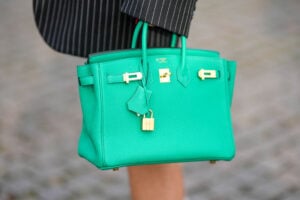
Fashion Victims: Dupes Are A Serious Problem

(Photo by Edward Berthelot/Getty Images)
Remember a time when people would purchase knockoffs in secrecy? Thanks to Gen Z and their TikTok and Instagram influencers, these knockoffs have been rebranded into the socially acceptable realm of “dupes.” Influencers brag about “not wanting to gatekeep the perfect dupe” for viral products like the Bottega Venetta drop earrings, the Skims bodysuits, the Restoration Hardware cloud couch, and the Lululemon align leggings. While dupes are generally harmless, the phenomenon has ignited a broader cultural shift, impacting small brands, stifling creativity, and even veering into the realm of illegal activities.
googletag.cmd.push( function() { // Display ad. googletag.display( "div-id-for-top-300x250" ); });Short for “duplicate,” “dupe” refers to a product that emulates another company’s product without attempting to deceive consumers about its origin. Dupes are typically legal and do not violate the intellectual property rights of the original company because they do not claim to be the original product and usually lack identical branding. Skims dupes are the perfect example. Fans of Skims appreciate the comfort and flattering fit of its basic stretchy tees, bodysuits, and shapewear. Influencers are identifying collections of similarly composed basics from various brands like Zara, H&M, and numerous others on Amazon as Skims dupes. Since the designs of these basic pieces generally do not qualify for intellectual property protection, Skims dupes, which do not feature the Skims logo, can be sold without the fear of infringement.
 Sponsored How Generative AI Is Disrupting Law Firm Billing Practices Amid legal landscape shifts, billing practices remain vital. With generative AI enabling faster, more efficient work, some law firms may adjust billing models accordingly. From LexisNexis
Sponsored How Generative AI Is Disrupting Law Firm Billing Practices Amid legal landscape shifts, billing practices remain vital. With generative AI enabling faster, more efficient work, some law firms may adjust billing models accordingly. From LexisNexis Members of Gen Z actively search for dupes on platforms like TikTok, Amazon, DHGate, and Shein. They eagerly share their findings with the rest of the world and boast about how much money they have saved from purchasing the dupe over the real thing. According to a study done by Marketplace Pulse for The Fashion Law, Amazon searches for Skims dupes have surpassed searches for authentic Skims products. Marketplace Pulse founder Jouzas Kaziukènas told The Fashion Law that the growing number of searches for “Skims Dupes” on Amazon suggests that “just like shoppers on Canal Street, [these] buyers on Amazon are not getting tricked into buying knockoff Skims products — they know and want cheaper lookalike copies.”
The TikTok algorithm plays a significant role in the spread of this dupe culture craze. After lingering a few seconds too long on a video of an influencer spilling her “favorite dupe” for the $40 Dior lip oil, my For You page on TikTok exploded with influencers claiming I can get the same glow on my lips for less than $5. Videos on TikTok with the #dupe tag have been viewed over 3.5 billion times. Leveraging features like TikTok shop, influencers can post commissionable links to these dupes directly in their TikTok videos. There are thousands of videos that look almost identical, all hyping the same dubious products.
googletag.cmd.push( function() { // Display ad. googletag.display( "div-id-for-middle-300x250" ); }); googletag.cmd.push( function() { // Display ad. googletag.display( "div-id-for-storycontent-440x100" ); }); googletag.cmd.push( function() { // Display ad. googletag.display( "div-id-for-in-story-youtube-1x1" ); });While true dupes may be perceived as harmless due to their legality, they harm small brands and stifle creativity. The association of the original product with an inferior and prolific dupe may cheapen the perception of the genuine item. Moreover, the allure of significantly lower prices for dupes often makes consumers hesitant to invest in the original product. Many Gen Z shoppers prioritize achieving a desired aesthetic over considerations of product quality and sustainability.
Marcelo Gaia, founder and designer of a small brand called Mirror Palais, is only one of the many designers who have been vocal about their disappointment with the rise of dupe culture. Gaia condemned a comment on his TikTok page expressing hope that Shein will create a dupe of his $800 design, as “shameful” and “disgusting” when posted on a small business’ page. Gaia also discussed his concerns over the “exploitative labor” and “unethical practices,” including child labor, that are associated with Shein, asking the commenter, “How do you lack a sense of empathy?”
Sponsored Sponsored How to Achieve Quicker, More Valuable Case Settlements with Minimal Effort: A Guide for Personal Injury Lawyers We’re pleased to share the “Top 5 Things Carriers Are Looking for in Demands” — a guide authored by a lawyer with deep experience on… From EvenUp and Above The Law
Sponsored How to Achieve Quicker, More Valuable Case Settlements with Minimal Effort: A Guide for Personal Injury Lawyers We’re pleased to share the “Top 5 Things Carriers Are Looking for in Demands” — a guide authored by a lawyer with deep experience on… From EvenUp and Above The Law  Sponsored How Generative AI Is Disrupting Law Firm Billing Practices Amid legal landscape shifts, billing practices remain vital. With generative AI enabling faster, more efficient work, some law firms may adjust billing models accordingly. From LexisNexis
Sponsored How Generative AI Is Disrupting Law Firm Billing Practices Amid legal landscape shifts, billing practices remain vital. With generative AI enabling faster, more efficient work, some law firms may adjust billing models accordingly. From LexisNexis  Sponsored The Smartfirm Playbook - Thriving In Today’s Legal Landscape Strategically using software and automation to boost efficiency and streamline operations, allowing for a laser-focus on practicing law. From Lawmatics
Sponsored The Smartfirm Playbook - Thriving In Today’s Legal Landscape Strategically using software and automation to boost efficiency and streamline operations, allowing for a laser-focus on practicing law. From Lawmatics  Sponsored The Smartfirm Playbook - Thriving In Today’s Legal Landscape Strategically using software and automation to boost efficiency and streamline operations, allowing for a laser-focus on practicing law. From Lawmatics
Sponsored The Smartfirm Playbook - Thriving In Today’s Legal Landscape Strategically using software and automation to boost efficiency and streamline operations, allowing for a laser-focus on practicing law. From Lawmatics Gaia has even found himself in the position of having to demonstrate to his followers that fast fashion dupes simply do not measure up to the quality of his original designs. But first he had to give a disclaimer to his sensitive Gen Z followers, expressing that he does not intend to hurt the feelings of people who cannot afford his products. In his TikTok video, Gaia compared the “biodegradable” and “hypoallergenic” silk fabric used in his garments to the “synthetic” and “plastic-like” fake silk used in Shein’s dupes.
Gaia’s sentiment is widely shared. According to a survey of 3,000 Gen Z and millennial consumers conducted by Trustpilot, 30% to 49% of shoppers are disappointed with the dupes they purchased online. Dupe influencers are even facing criticism for sharing bad-quality dupes, which they often fail to purchase themselves before advertising to their substantial followings. One influencer warned her followers never to buy dupes from influencers who do not personally try on the product. When trying on a dupe of a viral dress from a brand called Area, she exclaimed, “Is this a joke? This is awful.”
Dupe culture has resulted in more than just bad-quality products; it has also given rise to illegal activities. Semantically, the definition of a dupe does not encompass products that violate the intellectual property rights of the original company. However, influencers are also promoting counterfeits under the guise of dupes.
googletag.cmd.push( function() { // Display ad. googletag.display( "div-id-for-bottom-300x250" ); });Unlike dupes, counterfeits are illegal copies of products, which are intended to deceive consumers into believing they are purchasing the real product. Counterfeit products infringe on the intellectual property of the original product, including any trademarked, copyrighted, or patented design. While Skims T-shirts and Lululemon leggings do not reach the bar of intellectual property protection, Prada loafers and Loewe tank tops bearing brand logos do. Thus, exact replicas of these branded products constitute illegal counterfeits. Influencers are unboxing these counterfeits with their followers, normalizing them as being cool, trendy, and budget friendly. In reality, they are connecting their followers to criminals selling them illegal, poor quality, and potentially unsafe products.
There is nothing wrong with wanting to recreate a look for less. However, resorting to counterfeits and supporting unethical fast fashion companies is not the solution. Influencers must be educated as to the risks associated with promoting counterfeits. Many may not be aware of the illegality of their actions, such as the fact that the Trademark Counterfeiting Act of 1984 makes it a felony to intentionally traffic or attempt to traffic in goods and services and knowingly use a counterfeit mark on or in connection with such goods or services. Influencers should also be encouraged to guide their followers toward prioritizing quality over quantity. This not only ensures longer-lasting products and cost savings in the long run but also supports more ethical and sustainable production practices.
Sponsored Sponsored InterAction+ Brings Power Of CRM Software To Law Firms Of All Sizes The only legal CRM with exclusive content from LexisNexis®. From LexisNexis® InterAction+™
Sponsored InterAction+ Brings Power Of CRM Software To Law Firms Of All Sizes The only legal CRM with exclusive content from LexisNexis®. From LexisNexis® InterAction+™  Sponsored LawPay Pro Offers Upgraded Time And Billing Essentials AffiniPay’s latest product for the legal community, introduced earlier this year, presents a simple web-based solution for attorneys seeking seamless firm cash flow. From Above the Law
Sponsored LawPay Pro Offers Upgraded Time And Billing Essentials AffiniPay’s latest product for the legal community, introduced earlier this year, presents a simple web-based solution for attorneys seeking seamless firm cash flow. From Above the Law Such platforms as TikTok and Amazon, where the sale of dupes and counterfeits are prevalent, must also take action to curb the expansion of dupe culture. Although TikTok has established community guidelines that prohibit users from sharing any content that violates or infringes upon another party’s intellectual property rights, the enforcement seems lacking. There’s a need for more robust measures, such as blocking dupe-related hashtags and suspending accounts associated with dupe influencers.
Amazon has demonstrated a more proactive approach. In April, Amazon announced the Anti-Counterfeiting Exchange, an industry collaboration that allows participating retail stores to share information about sellers of counterfeits on their platforms. This initiative aims to create a database for identifying and stopping counterfeit perpetrators. In addition, Amazon’s Counterfeit Crimes Unit (CCU) conducted dozens of raids this year on counterfeit operations across the globe. Amazon also reported that it sued or referred for investigation more than 1,300 criminals in China, the European Union, the United Kingdom, and the United States, and disposed of more than 6 million counterfeit products. Maria Boschetti, a spokesperson for Amazon, also shared that the company does not allow sellers to use words like “dupe” or “fake” when describing products on the site.
Nicolette Shamsian joined Above the Law as a fashion law columnist in 2023. Nicolette earned her B.A., summa cum laude, in Political Science and minor in Entrepreneurship from the University of California, Los Angeles and her Juris Doctor from UCLA School of Law. Nicolette is an attorney whose work focuses on intellectual property litigation. As a fashion law aficionado, Nicolette enjoys leading discussions to keep attorneys up to date on noteworthy fashion law cases.
Topics
ATL Fashion, Biglaw, Dupes, Duplicates, Fashion, Fashion Law, Nicolette Shamsian, TikTok
Introducing Jobbguru: Your Gateway to Career Success
The ultimate job platform is designed to connect job seekers with their dream career opportunities. Whether you're a recent graduate, a seasoned professional, or someone seeking a career change, Jobbguru provides you with the tools and resources to navigate the job market with ease.
Take the next step in your career with Jobbguru:
Don't let the perfect job opportunity pass you by. Join Jobbguru today and unlock a world of career possibilities. Start your journey towards professional success and discover your dream job with Jobbguru.
Originally posted on: https://abovethelaw.com/2023/12/fashion-victims-dupes-are-a-serious-problem/